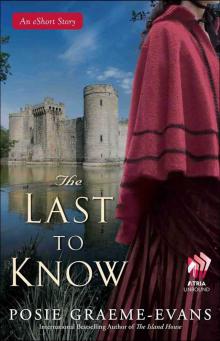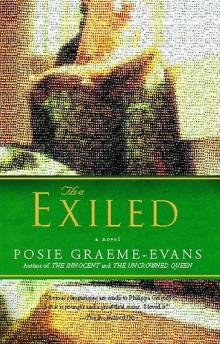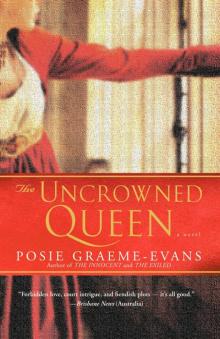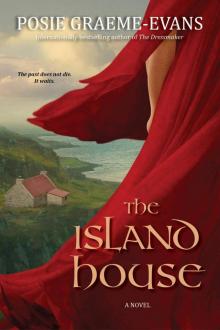- Home
- Posie Graeme-Evans
The Exiled Page 15
The Exiled Read online
Page 15
What he found hard to disguise, if Edward were truthful, was that the prospect of a month with his immediate family in one of his favourite cities — Brugge, was intensely exciting. Elisabeth was his wife, he honoured her as queen and she was attractive to him still, but she was increasingly hard work and it would be a relief to be out of the humid court atmosphere for a time, an atmosphere which caused him to weigh every word in her presence.
He’d feared, too, that when he made the announcement of her regency at tonight’s feast, as a way of keeping her anchored in England, she’d find a way to oppose his will, some subtle thing he’d not thought of. She was clever and sometimes, he had to confess, he actually relished the mental games of dominance they played.
It was a relief, though, to see her mood change after he’d made his pretty little speech honouring her good sense and his hopes for her careful stewardship of his kingdom. She seemed to relax a little; she even leaned towards him as she selected particularly choice gobbets of dolphin and langouste to place delicately on his tongue. And times like these, when she was so agreeable, so biddable, reminded the king all over again why he had been content to wed her, to the scandal of all of Europe.
He smiled at her. Yes. Those times were worth remembering, especially when he had had her first; very fast, immediately after they’d been secretly married at her mother’s house. Hastings and the men had stood patiently outside beside their saddled horses and he’d enjoyed the taming of her, if that was what he’d actually accomplished.
Elisabeth smiled back meltingly. She knew that look on Edward’s face and it pleased her. It meant she still had power over his body, as she had over his life, did he but know that. Tonight, after the feast, she would work at that power. Let Richard be regent — what did she care?
Brugge was a very fashionable destination — the clothes and the jewels were renowned all over Europe and attendance at this wedding would be the chance she craved, the chance to play at politics in a wider, deeper game: the allegiances of great states, and the building of great houses. Her own in this case.
Delighted at the thought, she clapped her hands to the master of the music — louder! Faster! Soon it would be time to dance, and after that, bed!
Anne was deeply asleep, exhausted, when the face swam up, laughing, from some cloudy, deep place inhabited by fear. She was jerked awake as terror hooked her heart.
Deborah woke too. Since they’d come home she’d slept on a palliasse in Anne’s bedroom. Her foster-daughter was physically recovered, her spirit another matter.
‘Deborah?’ The voice of a child — too proud to confess to night fears.
‘Yes, I’m here.’
‘It was him. The man who shot me. Why does he come to me?’
Deborah had no answer as she scrambled onto Anne’s bed and took the shivering, naked girl into her arms, unconsciously rocking her, soothing her with little pats. Anne was whispering, trying not to wake Edward and Jenna, asleep in the annex to her solar. Anne would not be separated from her son again, waking or sleeping.
For a few minutes Anne was content to be rocked then, ‘Deborah, will I see the king again?’
Deborah said nothing. Anne freed herself from the other woman’s embrace and leaned over to find the flint and candle beside her bed. The flint made a small grating click in the dark and struck white sparks. A second later, the candle flame wavered into being and Anne’s fingers glowed red as she cupped them around the light.
‘Deborah, please. Look into the flame for me. I must know. Something’s coming and I’m so afraid.’
Deborah shook her head.
‘You’ve got the sight. As yours had grown clearer, mine has faded.’ It was a lie, of course, but a kind one. She was too frightened to look into Anne’s future.
‘Mother, if it is your wish, let me live to see the boy grown — but you must protect this girl for I’m not strong enough.’
It was a constant prayer, and she prayed it now, for Deborah had not forgotten offering her own life as a sacrifice for Anne’s in that terrible moment when the girl had died. Yet, though Deborah prayed each night for guidance, and offered cock’s blood at full moon, she could not tell the auguries. She had been allowed to live — for now — but for how long?
‘Please help me?’ Anne was as frightened as she was, all defences stripped away. She sighed, a great gusting breath, almost a sob. Poor Deborah. What choice did she have?
‘Yes. I will help in the name of the Mother.’
Hastily, Deborah drew the heavy curtains around the bed. That would keep the light contained so that Jenna, sleeping beside Edward in the annex, would not be woken. But they would have to whisper the invocations ...
The two women were now within a red tent, for the brocaded bed curtains had a blood-coloured ground, a pattern of vine leaves picked out in gold, writhing over the surface.
Silently Anne held out the Jupiter finger of her right hand as Deborah searched for a brooch in the jewel coffer kept beneath Anne’s bed. Quickly she pricked the girl’s finger with the pin and held it over the flame so the blood dripped into its transparent heart.
The flame wavered and nearly died, then hissed up smoking, blue, green, then white again. ‘Will you say it?’ Deborah nodded and began the invocation as Anne held the candle dish between both hands, eyes fixed on the shifting, trembling flame.
‘Mother of all. Mother of all. The sacrifice has been made. Hear us.’
Deborah’s voice was barely a rustle, a breath of wind through standing corn. ‘By the four winds, and the seven seas, hear us. By the sun, by the moon, by the stars, hear us.’ The night had been still and hot. Now, suddenly, there was a thread of cold air and the curtains nearest to Anne rippled and stirred, very gently.
‘Mother of all. Mother of all. We are your children and we cannot see in the dark.’ The flame of the candle flared and dipped. A dancer’s shape, nearly human.
‘Mother of all. Mother of all. Come to us. Help your children.’ Now Anne had joined her voice to Deborah’s in a husky whisper and the older woman saw the girl’s pupils were immense — black wells drowning the topaz.
The candle snuffed out so suddenly Deborah jumped in fright. But not Anne. She sat rock still, breathing more and more deeply. Her eyes closed into the silence. And then she began to speak.
‘You ask for help. I will give it. Wings of darkness — you are right to feel afraid. Wings of darkness. But the power is stronger. Trust that. See what is needful, but beware the message, and the messenger. Fate twists in your hands. Sacrifice. Storms. Death in your service.’
It was colder now, much colder. The Goddess was most often a benign force, but tonight there was something older, fiercer, wrapping them around. There was a grating noise, barely human, as Anne cleared her throat, then, ‘You asked for help. I answered. I am who I am. I guard. I guard.’
The voice trailed away as Deborah touched Anne’s arm.
‘Anne. Anne! Can you hear me? Anne!’ The girl was unresponsive as Deborah searched for the candle, and the flint. Seconds later the warm flame showed her that Anne was staring out into the red darkness, eyes wide and fixed. Deborah made the sign of the Goddess in front of Anne’s impassive face.
‘Do not be frightened, I am here. I won’t leave you.’ Deborah tried to offer comfort, but the waiver in her voice told the truth.
‘I know that. I am grateful.’ It was Anne’s own voice and Deborah swallowed the acid of relief. Just at that moment, a warm wind stirred the curtains of the bed and the candlelight winked on the gold thread of the woven vines. It was as if they were alive, twining around them, making a bower to keep them safe from harm.
‘It wasn’t the Goddess, though, was it?’
Anne tried to keep the fear out of her voice. She’d heard what’d been said, but from a great distance; now all she felt was empty and cold.
‘No. It was not. But it was real.’
On the other side of the curtain, in the annex, Jenna lay awake. She had not
heard everything, but she had heard enough. She shivered. Demons. Her mistress raised demons. Fearfully, the girl crossed herself. What should she do and say in confession? Would she be damned for all eternity if she did not tell the priest what she knew?
The little boy stirred and turned restlessly in his sleep beside her. His sweet breath was on her cheek and Jenna felt the tears slip down her face. She loved her mistress, she loved Edward — but she could not face hellfire.
Chapter Twenty-Two
At last the news arrived. The English ships! They’d been sighted as dawn rose out of the sea. The whole, huge wedding fleet was off the coast near Sluis and would be docked in the before-noon. The mayor of Sluis had journeyed out in his official lighter to meet the flagship of the fleet, and conduct the party to shore whilst his town erupted in long-planned celebration: wine running in the public fountains, and choirs gathering at every street corner to welcome the bride, her brother the king and Duchess Cicely, the king’s mother, as they set foot on the land.
In Brugge, sudden noise and energy convulsed the Prinsenhof as an exhausted courier nearly killed his horse riding from the coast in foam-splattered record time to bring the news; but he was well rewarded for his loyalty by Duke Charles, receiving twenty-one gold Angels — one for each year of the bride’s age — to ease his quivering muscles.
And, of course, the news could not be contained. Like fire it burned outwards from the duke’s palace into the town, carried from mouth to mouth, leaving, at its passing, a rising babble of sound and running feet. The Bruggers shut their shops, abandoned their Markt stalls and scattered, as one, to dress and join the wedding procession. It was common knowledge that once Margaret reached Damme, the little town on the river Zwijn which linked Brugge to the seaport at Sluis, she would be married to their Duke Charles in a private ceremony before a small number of invited guests, followed by a mass in the cathedral there. Later, the bride’s party would journey by barge along the river to the city before a ceremonial entrance, and progress through its streets as their new duchess. It would be the first, and the biggest, of an expected ten days of semi-riot and extravagance designed to celebrate the wedding.
Before she heard the news, Anne was with Hans Boter in Mathew Cuttifer’s warehouse as she dictated a letter seeking extra bales of the newest, jewel-bright velvets from Florence ahead of the winter to come.
Truce might have been declared between her and the Guild, but she had not forgiven, nor forgotten. Nor retired. After her near murder, she’d decided that advance, rather than retreat, was the only way to show the world that she was alive, and intended to stay that way.
Now, in the cool of the counting floor, where it was dark — the shutters having been drawn early against the morning heat — she finished the text of her letter and signed it calmly, fixing her signet into the wax carefully so that her device, the arms given to her personally by King Edward, would not smear or distort.
‘Yes, Maxim?’ The steward arrived flushed and agitated, though hoping he’d disguised the excitement he felt.
‘Lady, the English have been sighted.’
At last! Legs suddenly weak, breath short in her throat, somehow Anne sounded calm. ‘Enough for today, Meinheer Boter. Now it is holiday! Maxim, tell them all, we must make ready. Quickly!’
This wedding had been the focus of their thoughts for months and now it was finally here. The house was spotless, the kitchen, the pantry and buttery stocked with food — fresh and preserved — and their own beer, newly brewed, with which to keep open house. All that remained was to dress in the holiday livery Mathew and Anne had jointly provided and decorate the outside of the hall with ropes of flowers, ribbons and hangings entwining the initials C & M, in honour of the bride and groom. Margaret’s barge would pass directly beneath their windows on its way into the city before the bridal party progressed through the streets to the Prinsenhof — their house must outshine all its neighbours.
Outwardly Anne remained quite calm, though she could feel her heart thud unevenly as the blood boomed in her head. As Deborah and Jenna dressed her — in shimmering jewel-green satin, the colour of new love and new beginnings — stable boys took invitations to a select few friends and yes, even some of the English merchants, since the house, right on the canal, had an excellent view and many large windows.
Never had Brugge sounded and seemed more like a beehive than today. As Deborah wound ropes of pearls and emeralds around her throat, Anne stood in the open casements, sunshine flooding down as laughter and happy shouting from the town filled the air outside and inside the room.
This marriage was welcome, this princess most welcome. The trade worries of the last ten years were melting away — the future of Brugge was assured by this strong alliance. Let others worry about the rumours that the river was silting up — the Zwijn, which was the conduit of all the city’s wealth — today the times were pregnant with promise. New opportunities would flow from this marriage and Brugge would once more eclipse her rivals; good English Crowns and Angels passing from hand to hand would see to that.
There was a booming crash on the front door downstairs, so loud it was heard even here, upstairs in her own solar — guests! It had begun!
Within an hour, closer and closer to the midday-bell — around which time the bride and her new husband were expected to arrive — Mathew Cuttifer’s fine hall was filled with brilliantly dressed, happily anxious guests; there were even some of the English merchants, including the Caxtons. The household servants passed to and fro amongst Anne’s friends, her rivals and some of her enemies in the perfumed hall conveying food and wine and beer as Anne herself held court.
William Caxton caught Anne’s eye and bowed, sweeping off his flat velvet bonnet. Maud caught the movement from the other side of the room where she was standing with friends, other merchants wives, in rigid disapproval and envy of the opulent display all around them. She frowned; her husband was fond, much too fond, of this trollop. She’d have to rescue him from his own partiality.
Too late! William had sauntered over to Anne and though Maud could not hear what they were saying, it was flagrantly clear he was enjoying her company.
Angry, Maud went to swallow some of the admittedly truly excellent wine offered by this pestilential house and choking, had to be thumped on the back, which, most unfortunately, broke the string of her necklace — her best necklace! — so that gold beads, coral and garnets were scattered all over the waxed floor tiles and skittered everywhere.
During the ensuing fuss, Maud was distracted and so she did not see, though others did, William raise Anne’s hand to his lips.
‘Lady, your beauty confuses me. I do not know how to describe it. But I am so thankful, praise God, that you are restored to us, so that I may at least go on trying to find the words!’
‘A long speech for such a little subject, Master Caxton.’
Anne was warm and direct when she spoke to men she liked — another plus in William’s eyes — another outrage to those who were jealous.
‘You are better?’
Anne nodded. ‘Yes. I am healed. And because of Deborah, there is only the very smallest scar — which none but those closest to me will ever see.’
She laughed. And so did he, giddily. Thinking about that part of Anne’s body added distraction to his words.
‘It is surely a miracle that the wound closed at all. I thought you would die.’
It was a dark thing to say on such a sunny day — not the bright, meaningless party-chatter expected from a guest — and the shadow of the truth he had spoken was nearly tangible. ‘Some say I did, Master William.’
A strange and dangerous remark, and William only just stopped himself from sketching a cross in the air — that made her smile.
‘It’s mentioned in the Bible, you know. A glimpse of paradise and then, return to life. And there’s Lazarus too, isn’t there?’
This was a worrying conversation. William didn’t think of himself as a bigot, but surely
this was close to blasphemy?
Maxim appeared at Anne’s side, visibly swelling with the news he contained. Anne listened as he mouthed something in her ear then, face radiant, clapped her hands for silence.
‘My friends, Maxim says that the barges have been sighted! Come, join me upstairs so that we can cheer them on their way to the Prinsenhof!’
The stair was wide to the upper quarters, but the rush of her guests, whilst it was decorous, was determined, so some were in danger of being pushed over the carved balustrade by the press of people.
Anne led them herself and as they entered her own private quarters, many were astonished. For the occasion her bed had been moved against one wall, but the space around it was still great, great enough to accommodate forty or so people — and all the servants — with ease.
As they crowded to the casements, thrown open to let in the air and the view, Anne did her best to arrange matters so that each one of her guests could see — tallest at the back, youngest and smallest seated on the window seats — whilst she managed to reserve a place for herself in the far corner of one of the windows. She also made sure that Maxim, Deborah and the other household people had one casement all to themselves — to the continuing scandal of Maud and her friends.
Looking down, Anne could see the banks of the canal, curving away towards the Kruispoort, and each window of every house filled to suffocation with the people of Brugge — colourful as the heber in high summer.
Everywhere there were banners, embroidered or painted with the Red Bear, the symbol of the city, and images of the Virgin, special patroness of Brugge, many personally designed by Hans Memlinc. And too, freshly gilded busts and bas-reliefs of the Holy Mother and Child were everywhere in niches at street corners, whilst polychromed life-sized statues of Mary were set up on plinths at each raised bridge over the canal, garlanded with white roses, as an honour to the Princess Margaret of York, now their duchess.

 The Last to Know
The Last to Know The Exiled
The Exiled The Uncrowned Queen
The Uncrowned Queen The Island House
The Island House Wild Wood
Wild Wood